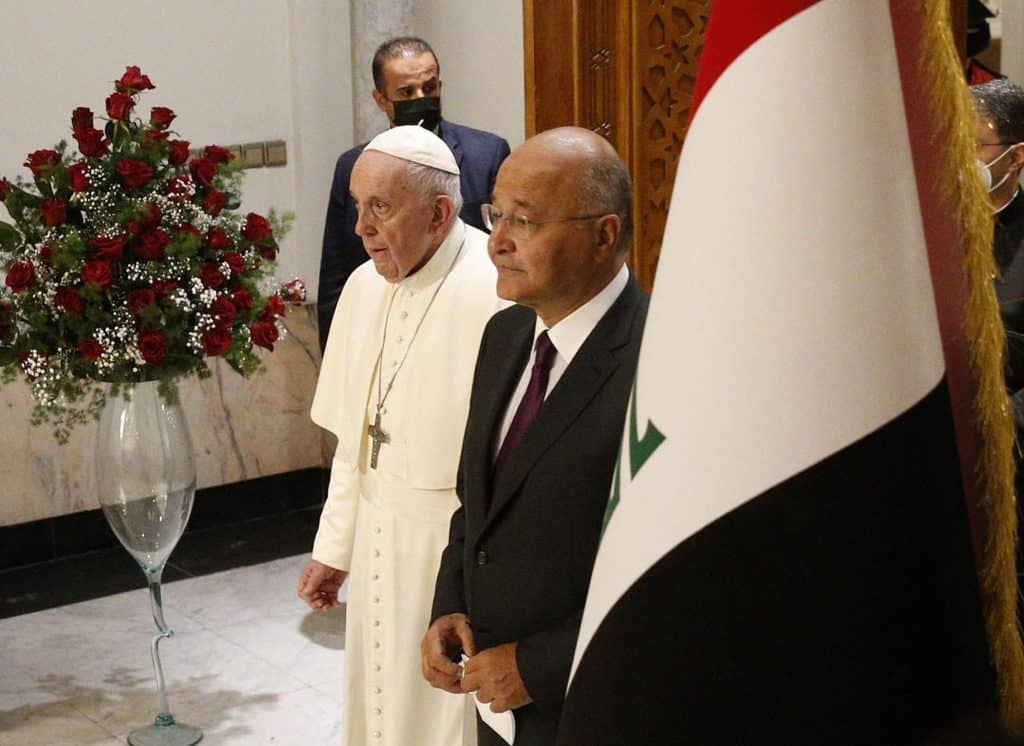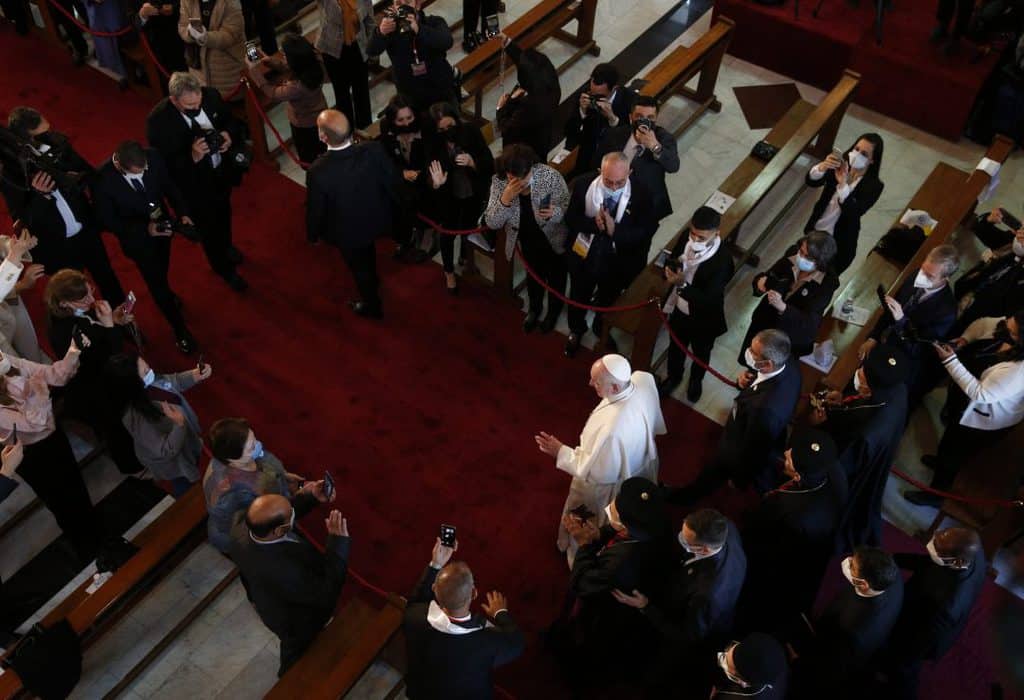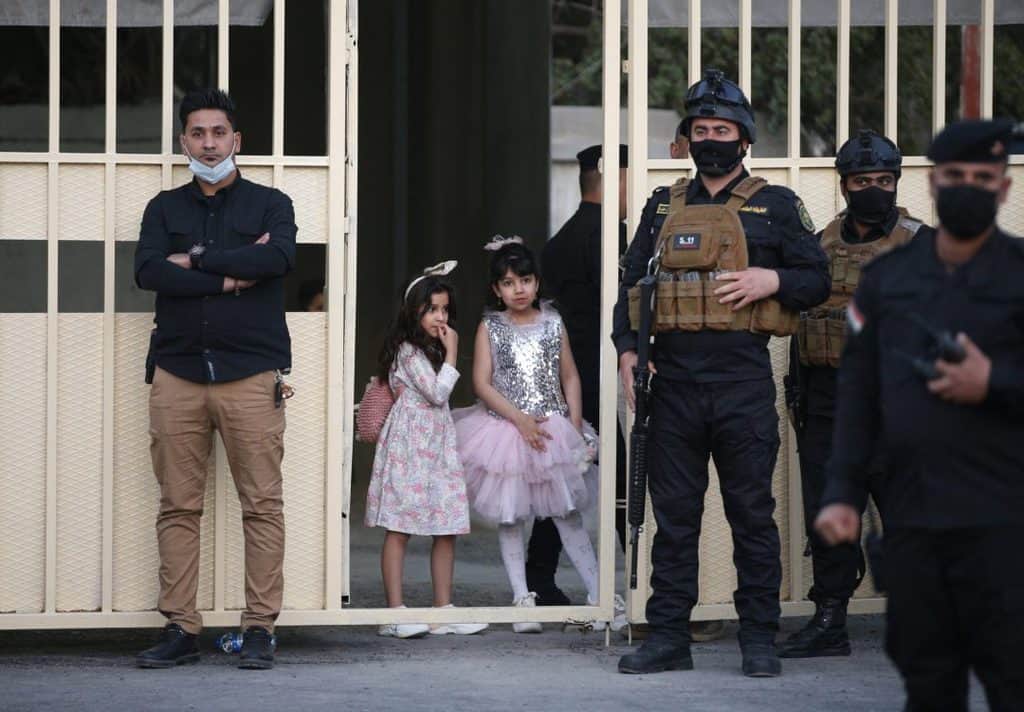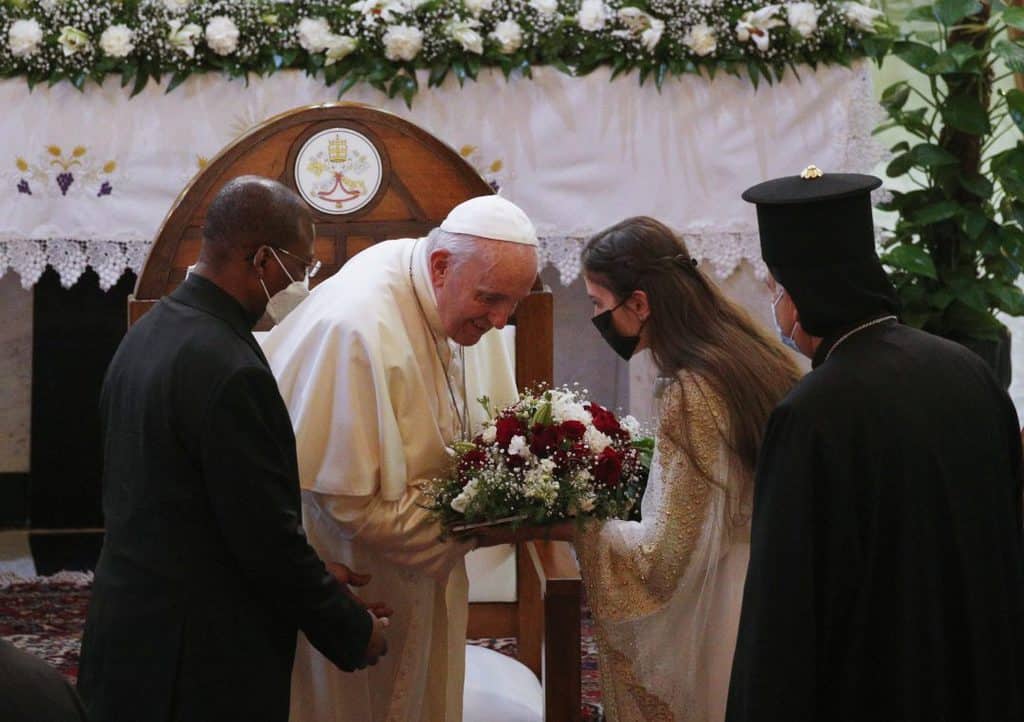Pope Francis outlines themes of his Iraq trip, including paying homage to Christians martyrs and condemning violence.
By Cindy Wooden, Catholic News Service
BAGHDAD (CNS) – On the first day of his historic trip to Iraq, Pope Francis honored 48 Christians killed in a Baghdad cathedral “hallowed by the blood of our brothers and sisters” murdered there in a terrorist attack. The pope said their sacrifice must motivate faith and a commitment to working for the common good.
The Syriac Catholic Cathedral of Our Lady of Deliverance, sometimes referred to as Our Lady of Salvation, is now a shrine to those who died Oct. 31, 2010, when militants belonging to a group linked to al-Qaida laid siege to the church, detonating explosives and shooting people. The attack killed 48 Catholics, including two priests, and more than 100 people were wounded.
Before the terrorist attack and the 2014-2017 war against Islamic State militants, some 5,000 Syriac Catholic families in Iraq frequented the cathedral, according to the Vatican. Now, it said, no more than 1,000 families belong to all three Syriac Catholic parishes in the capital.
Earlier, Pope Francis met and with civic and cultural leaders at the presidential palace in Baghdad came shortly after he landed

The president welcomed Pope Francis as a “great and dear guest,” expressing his gratitude that the pope made the trip “despite recommendations to postpone the visit because of the exceptional circumstances the world is going through because of the pandemic and despite the difficult conditions that our wounded nation is going through” with sporadic waves of violence.
Facing those dangers and visiting anyway “in reality doubles the value of your visit in the eyes of Iraqis,” the president told the pope.
His first speech of the Iraq trip, the pope outlined the themes expected to resonate throughout the March 5-8 visit: paying homage to the Christians martyred by Islamic militants over the past 20 years; insisting belief in one God, the father of all, means all people are brothers and sisters; encouraging a continued commitment to rebuilding the physical and social fabric of the country, including with international aid; and condemning all recourse to violence.
Repeating a phrase he used in a video message to the Iraqi people on the eve of his visit, Pope Francis told the civic authorities, “I come as a penitent, asking forgiveness of heaven and my brothers and sisters for so much destruction and cruelty. I come as a pilgrim of peace in the name of Christ, the prince of peace.

Later, at the cathedral, Pope Francis met in the church with the nation’s bishops and a representative group of priests, religious, seminarians and catechists. They came from the Syriac Catholic community of Iraq, but also Chaldean Catholic, Armenian Catholic and Latin-rite Catholic parishes.
The pope told them that the memory of the 48—whose sainthood cause is underway—and of the countless other Christians killed in the decade since, should “inspire us to renew our own trust in the power of the cross and its saving message of forgiveness, reconciliation and rebirth.”
“Christians are called to bear witness to the love of Christ in every time and place,” he said. “This is the Gospel that must be proclaimed and embodied in this beloved country as well.”
Syriac Patriarch Ignace Joseph III Younan welcomed Pope Francis to the cathedral, telling him the 48 “mixed their blood with that of the Lamb,” and showed “their oppressed, killed or uprooted brothers and sisters in Iraq and the Middle East” that the risen Lord continues to walk with his people.
Cardinal Louis Sako of Baghdad, the Chaldean Catholic patriarch, told the pope that the Syriac Catholic cathedral and its martyrs are a poignant and powerful sign of what Christians throughout Iraq have endured and survived over the past decade.

“This paternal visit of yours,” he told the pope, “gives us the strength to overcome adversity, reassures us that we have not been forgotten and generates in us the confidence and enthusiasm to continue our journey of faith and evangelical witness.”
Pope Francis said he understood how the country’s small Christian community, which has been present in the country since the first century, could lose its enthusiasm.
“We know how easy it is to be infected by the virus of discouragement that at times seems to spread all around us,” the pope told them. “Yet the Lord has given us an effective vaccine against that nasty virus. It is the hope born of persevering prayer and daily fidelity to our apostolates.”
“With this vaccine, we can go forth with renewed strength, to share the joy of the Gospel as missionary disciples and living signs of the presence of God’s kingdom of holiness, justice and peace,” Pope Francis said.
The women in the congregation responded several times to his speech with zagharit, an ululation of praise or honor.
With the representatives of the various Catholic communities wearing masks and socially distanced inside the church, the pope also encouraged them to reach out to one another and to other Christians.

“God himself is the artist who imagined this carpet, patiently wove it and carefully mends it, desiring us ever to remain closely knit as his sons and daughters,” the pope said.
But, being human and prone to sin, individuals and groups can create knots that stop the process of weaving, he said. The knots “can be untied by grace, by a greater love; they can be loosened by the medicine of forgiveness and by fraternal dialogue, by patiently bearing one another’s burdens and strengthening each other in moments of trial and difficulty.
Following Pope Francis’ address, the socially distanced congregation recited the “Lord’s Prayer” prayer in Arabic.
The pope signed the church’s book of honor, leaving a message for the Syriac Catholic congregants.
His visit to Iraq was being watched live on satellite TV by thousands in Iraq and throughout the Middle East.
Featured image: Pope Francis signs a book with a message for Syriac Catholics at the Cathedral of Our Lady of Deliverance in Baghdad March 5, 2021. Also pictured, from left: Syriac Catholic Patriarch Ignace Joseph III Younan, Syriac Catholic Archbishop Ephrem Yousif Mansoor Abba of Baghdad and Chaldean Patriarch Louis Sako of Baghdad. (CNS photo/Vatican Media via Reuters)

